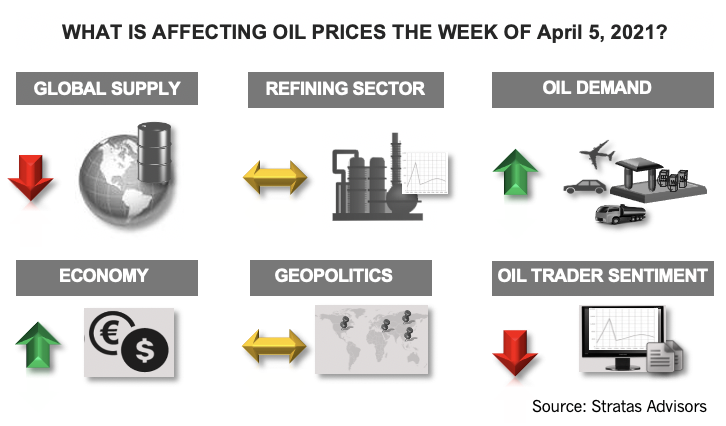
(Source: Shutterstock.com; image of OPEC headquarters in Vienna by LukeOnTheRoad / Shutterstock.com)
[Editor’s note: This report is an excerpt from the Stratas Advisors weekly Short-Term Outlook service analysis, which covers a period of eight quarters and provides monthly forecasts for crude oil, natural gas, NGL, refined products, base petrochemicals and biofuels.]
The price of Brent crude closed last week at $64.86, which was essentially unchanged from the close of the prior week of $64.63. The price of WTI closed the week at $61.45 after closing the prior week at $60.97. The week of unchanged prices came with the announcement of production increases from OPEC+ among other developments.
At the end of last week, OPEC+ decided finally to add volume to international markets, after several months of cuts and rollovers. The incremental OPEC+ volume will arrive in May and June (with additional 350,000 bbl/d each month) and an additional 450,000 bbl/d in July.
On top of this cumulative volume to be added by all members of OPEC+, Saudi Arabia will be reversing it of 1 million bbl/d production. On this basis, Saudi Arabia will add 250,000 bbl/d in May, 350,000 bbl/d in June and additional 400,000 bbl/d in July. When considering both contributions, OPEC+ will be adding an additional 2.15 million bbl/d of supply by July, as indicated by the table below.
OPEC+ Added Volumes (bbl/d) |
||||
| May | June | July | Total | |
| OPEC+ | 350,000 | 350,000 | 450,000 | 1,150,000 |
| Saudi Arabia | 250,000 | 350,000 | 400,000 | 1,000,000 |
We draw several other important conclusions from the latest OPEC+ agreement:
Saudi Arabia has been able to keep the cartel’s cohesion, even with the bold move of unilaterally cutting 1 million bbl/d back in January, which could have caused instability by incentivizing Russia and other countries to avoid further production-related discipline.
OPEC+ is adjusting to market conditions, and to a more nuanced approach, by gradually adding production each month. This approach contrasts with the way the extended cartel originally approached the COVID-19 recovery, when a year ago, after cutting 9.7 million bbl/d, OPEC+ provided specific milestones for supply additions of 2 million bbl/d over an extended period.
Like the previous administration, the Biden administration appears to be willing to take an active role in trying to influence OPEC+ decisions. Despite Prince Abdulaziz Bin Salman’s denial that the U.S. Secretary of Energy pressured in any way to increase global supply, the general consensus is that there was some push in the form of expressing the need for “affordable fuels” to keep from disrupting economy recovery.
The OPEC+ decision is positive news for the global economy in that it implies that OPEC+ will add supply in response to increasing demand expectation, which will prevent a spike in oil prices.
The outcome of the meeting highlights the apparent belief by OPEC+ that, at least for the near-term, the U.S. shale sector will not ramp up production in any meaningful way and crash oil prices. Additionally, the supply increases by OPEC+ prevent U.S. shale producers (and other non-OPEC producers) from ramping up production to fill a supply gap and to take market share from OPEC+ members.
RELATED:
Pioneer’s Latest Acquisition to Help Alleviate Concerns of Another Shale Drilling Binge
Last week, we stated that outcome from the OPEC+ meeting would provide another datapoint that indicates the future philosophy of Saudi Arabia with respect to the oil market—either a philosophy that entails a greater focus on short-term price support, and less concern about the stability of the global economy and long-term demand; or a philosophy that is more focused on the longer-term stability of the oil market. Based on the outcome of the meeting, it would appear that Saudi Arabia’s current strategies are aligned with the latter philosophy—one that is more sophisticated and strategic.

About the Author:
John E. Paise, president of Stratas Advisors, is responsible for managing the research and consulting business worldwide. Prior to joining Stratas Advisors, Paisie was a partner with PFC Energy, a strategic consultancy based in Washington, D.C., where he led a global practice focused on helping clients (including IOCs, NOC, independent oil companies and governments) to understand the future market environment and competitive landscape, set an appropriate strategic direction and implement strategic initiatives. He worked more than eight years with IBM Consulting (formerly PriceWaterhouseCoopers, PwC Consulting) as an associate partner in the strategic change practice focused on the energy sector while residing in Houston, Singapore, Beijing and London.
Recommended Reading
Axis Energy Deploys Fully Electric Well Service Rig
2024-03-13 - Axis Energy Services’ EPIC RIG has the ability to run on grid power for reduced emissions and increased fuel flexibility.
Tech Trends: AI Increasing Data Center Demand for Energy
2024-04-16 - In this month’s Tech Trends, new technologies equipped with artificial intelligence take the forefront, as they assist with safety and seismic fault detection. Also, independent contractor Stena Drilling begins upgrades for their Evolution drillship.
Tech Trends: Safety, Speed, Savings: Automation is Transforming Drilling
2024-03-26 - Drilling is getting smarter through automation, delivering efficiency, consistency and reliability.
2023-2025 Subsea Tieback Round-Up
2024-02-06 - Here's a look at subsea tieback projects across the globe. The first in a two-part series, this report highlights some of the subsea tiebacks scheduled to be online by 2025.
TGS, SLB to Conduct Engagement Phase 5 in GoM
2024-02-05 - TGS and SLB’s seventh program within the joint venture involves the acquisition of 157 Outer Continental Shelf blocks.





